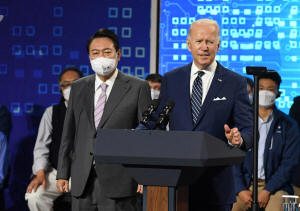Biden, South Korea's Yoon vow to deter North Korea but offer COVID aid
 Send a link to a friend
Send a link to a friend
 [May 21, 2022] By
Trevor Hunnicutt and Josh Smith [May 21, 2022] By
Trevor Hunnicutt and Josh Smith
SEOUL (Reuters) - President Joe Biden and
his new South Korean counterpart agreed on Saturday to hold bigger
military drills and deploy more U.S. weapons if necessary to deter North
Korea, while offering to send COVID-19 vaccines and potentially meet Kim
Jong Un.
Biden and Yoon Suk-yeol said their countries' decades-old alliance
needed to develop not only to face North Korean threats but to keep the
Indo-Pacific region "free and open" and protect global supply chains.
The two leaders are meeting in Seoul for their first diplomatic
engagement since the South Korean president's inauguration 11 days ago.
The friendly encounter between allies was clouded by intelligence
showing North Korean leader Kim Jong Un is prepared to conduct nuclear
or missile tests.
Yoon had sought more assurances that the United States would boost its
deterrence against North Korean threats. In a joint statement, Biden
reaffirmed the U.S. commitment to defend South Korea with nuclear
weapons if necessary.
The two sides agreed to consider expanding their combined military
drills, which had been scaled back in recent years in an effort to lower
tensions with the North.
The United States also promised to deploy "strategic assets" - which
typically include long-range bomber aircraft, missile submarines, or
aircraft carriers - if necessary to deter North Korea, according to the
statement.

Both leaders said they were committed to denuclearising North Korea and
were open to diplomacy with Pyongyang.
"With regard to whether I would meet with the leader of North Korea, it
would depend on whether he was sincere and whether he was serious,"
Biden told a joint news conference.
He said Washington had offered COVID-19 vaccines to China and North
Korea, which is combating its first acknowledged outbreak. "We've got no
response," Biden said.
North Korea reported more than 200,000 new patients suffering from fever
for a fifth consecutive day on Saturday, but the country has little in
the way of vaccines or modern treatment for the pandemic.
EXPANDING ALLIANCE
The U.S.-South Korea alliance, which dates to the 1950-1953 Korean War,
must further develop to keep the Indo-Pacific "free and open", Biden
said.
He said the alliance was built on opposition to changing borders by
force - an apparent reference to Russia's war in Ukraine and China's
claims over Taiwan.
[to top of second column]
|

U.S. President Joe Biden speaks with South Korean President Yoon
Suk-youl during a press conference after visiting at the Samsung
Electronic Pyeongtaek Campus in Pyeongtaek, South Korea, May 20
2022. Kim Min-Hee/Pool via REUTERS

Changes in international trade and supply chains gave
new impetus for the two countries to deepen their relationship, Yoon
said, calling for cooperation on electric batteries and
semiconductors.
Biden used the visit to tout investments in the United States by
Korean companies, including a move by South Korea's Hyundai Motor
Group to invest about $5.5 billion to build its first dedicated
fully electric vehicle and battery manufacturing facilities in the
United States.
The two leaders toured a massive Samsung semiconductor plant on
Friday, where Biden said countries like the United States and South
Korea that "share values" needed to cooperate more to protect
economic and national security.
Yoon said the concept of economic security will include cooperating
in case of shocks in the foreign exchange market.
The South Korean president, keen to play a bigger role in regional
issues, said his country would join Biden's Indo-Pacific Economic
Framework (IPEF), which will be announced during the trip to set
standards on labour, the environment and supply chains.
But, given that China is South Korea's top trading partner, he
struck a cautious tone in public on the topic of explicitly
countering Beijing. He said on Friday that South Korea's joining the
IPEF did not have to conflict with the countries' economic ties.
Although White House officials have sought to play down any explicit
message of countering China, it is a theme of Biden's trip and one
that has caught the eye of Beijing.
"We hope that the U.S. will match its words with deeds and work with
countries in the region to promote solidarity and cooperation in the
Asia-Pacific, instead of plotting division and confrontation,"
Chinese envoy for Korean affairs Liu Xiaoming, said on Twitter.
(Reporting by Trevor Hunnicutt, Hyonhee Shin, Jack Kim, Eric Beech
and Josh Smith; Editing by William Mallard)
[© 2022 Thomson Reuters. All rights
reserved.]
This material may not be published,
broadcast, rewritten or redistributed.
Thompson Reuters is solely responsible for this content.
 |